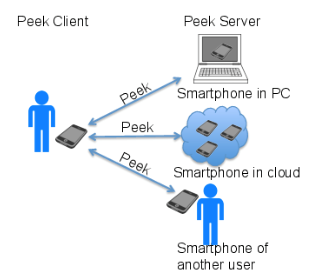Ragupathy Sivakumar and Uma Parthavi Moravapalle from the School of Electrical and Computer Engineering at Georgia Tech have developed PEEK - a mobile-to-mobile remote computing protocol. PEEK is application agnostic as well as operating system (OS) and device independent. PEEK’s unique value proposition is in the three features it supports: 1) Multi-touch support; 2) Context association and 3) Flexible frame compression. PEEK clients directly capture touch interactions, without a need for mouse translation, in a suitable touch message format to avoid loss of integrity, and send them to the PEEK server for execution. Because the message format is OS agnostic, clients and servers on different OS can communicate with each other.
PEEK clients also capture and transmit various sensor (e.g., accelerometer, gyrometer, compass) readings on the device for building context in a mobile-to-mobile remote computing session. This enables a rich application experience. PEEK’s frame compression methodology selects one of three compression schemes for use based on factors like CPU load, application type, memory usage, and network bandwidth. PEEKuses video compression techniques when it detects rapidly changing screen content.
- Supports multi-touch mobile-to-mobile interaction with an order of magnitude increase in supported gestures.
- Enables rich context transfer between remote mobile devices, and enables the client to experience the remote client’s context by providing access to all the sensor data on the remote client.
- Compression scheme used is optimized to mobile device operating conditions such as application demands on CPU load, memory usage, and available network bandwidth.
PEEK supports real-time collaboration, supporting a host of services such as: device and application trouble-shooting; application help support by remotely accessing an application and walking a user through its operational features; and remote participation in gaming by the remote user collaborating with a device user to play a game on the same device. With PEEK, cloud providers can support a user with a low end phone to access a virtual instance of the device hosted on a resource rich cloud and complete resource heavy tasks like panorama stitching and image manipulation. PEEK can be used to support enterprise privacy enabling user access to a sand-boxed virtual smartphone environment on the enterprise cloud.
Mobile computing devices, such as smartphones and tablets, are now the preferred computing platform over desktop computing, delivering always-on access to users. New and emerging mobile computing applications require remote access to applications on other mobile devices. Mobile-to-mobile application agnostic remote computing protocols are necessary to enable such remote access. Existing protocols for desktop remote computing are not adequate to realize a rich experience with mobile-to-mobile remote computing. Solutions are needed that allow a user to exploit multi-touch and access to diverse sensors on the remote phone.

